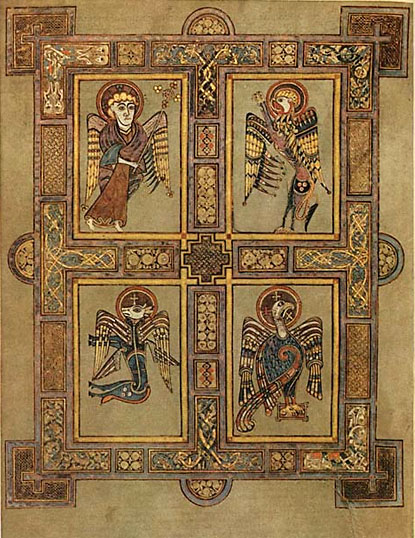End Begets Beginning
 James Jordan maintains that Matthew’s Gospel was written first. Eugen Rosenstock-Huessey does too.
James Jordan maintains that Matthew’s Gospel was written first. Eugen Rosenstock-Huessey does too.
Jordan writes:
From ancient times it has been known that Matthew wrote first (despite all the nonsense of liberals during the last century). Eugen Rosenstock-Huessy, in his out-of-print book The Fruit of Lips, presents some compelling arguments to show that each of the gospel writers was adding to the previous writer, and in fact that each gospel picks up where the preceding one left off in terms of theme.
Matthew presents Christ as Ox/Moses. His book is full of speeches, for the ear is central. Jesus is law-giver. God is the Father and the God of heaven, and “kingdom of heaven” is Matthew’s term (pointing back to the symbolism of the Tabernacle).
Mark presents Jesus as a man of action. Mark presents Jesus as Lion/David, performing great works, swiftly going here and there, for the hand is central. In Mark, Jesus always does things “immediately.” Mark is shorter than Matthew not because Mark wrote first (what a silly argument!), but because Mark does not provide the great sermons. The field of action is the land.
Luke presents Jesus as the Eagle/Prophet, interacting with gentiles and women much more than the other two. In Luke, Jesus is always on the move, and half of his book is taken up with the Travel Narrative to Jerusalem, for the foot is central. The Spirit receives the great emphasis in Luke and Acts. The field of action is the world.
Finally, John presents Jesus as Man, the Image of God. The phrase “son of man” used in the other gospels points to Jesus as second Adamic priest, king, and prophet. The phrase “son of God” used in John points to Jesus as the image of God, true humanity as well as true God. John’s Jesus tours the sanctuary, which represents heaven. Thus, John puts us in the Throneland.
James B. Jordan, The Production of the New Testament Canon: A Revisionist Suggestion.
Now, Fruit of Lips is back in print.
John the evangelist was asked in his dotage why his sermon was so short that he would only say, “Children, keep each other at heart.” He gave the famous answer, “For two reasons: it is enough and the Lord has said so.”
The four gospels suffice since every one of the four claims made by Ichthys has become “lips” in one man’s dramatic change of mind. The Lord has made these four claims, no more. And he has said so. Let us read the Gospels once more: Do they give evidence of actual dependence beyond the “material” used? Yes, they do. They beget each other.
Every Gospel begins exactly at the point to which the previous Gospel has progressed on its tortuous path. The last word of the one sets the tune and is the overture for the next. The “last word” is not meant in a literal or pedantic sense; by it, we understand the last step of thought, reached in the dramatic progress.
If this is so, then the Gospels continue each other, each beginning to think and to speak where the previous evangelist had ended, and turning his final word into an opening of a new drama. Matthew’s last word is that Jesus has become the Son of God, in the sense of the Trinity. Mark begins: The Son of God (not “the Son of David,” as Matthew). Mark ends with the “Mission of the ministers of the word.” Fittingly, the missionary Luke begins with “the ministers of the word.” Luke, furthermore, ends Acts with a long statement: That the Jews have ears and do not hear and have eyes but do not see, but “the Gentiles shall hear.”
Majestically, John breaks in at exactly this last word of Acts: “Indeed, the darkness has not seen the light, the world has not seen it, but his own have beheld his glory, and we have seen him.” Also, Luke ends with the power of the Gospel; John begins with the World’s Power.
This is not an accident, this connection of ends and beginnings. Laboriously every Gospel works itself up to its climax. Easily the mantle of the Gospel writer then falls on the man who is prepared best to take over at this very point.
A detailed chart follows, but you will have to purchase the book for that: Eugen Rosenstock-Huessy, Fruit of Lips.

























